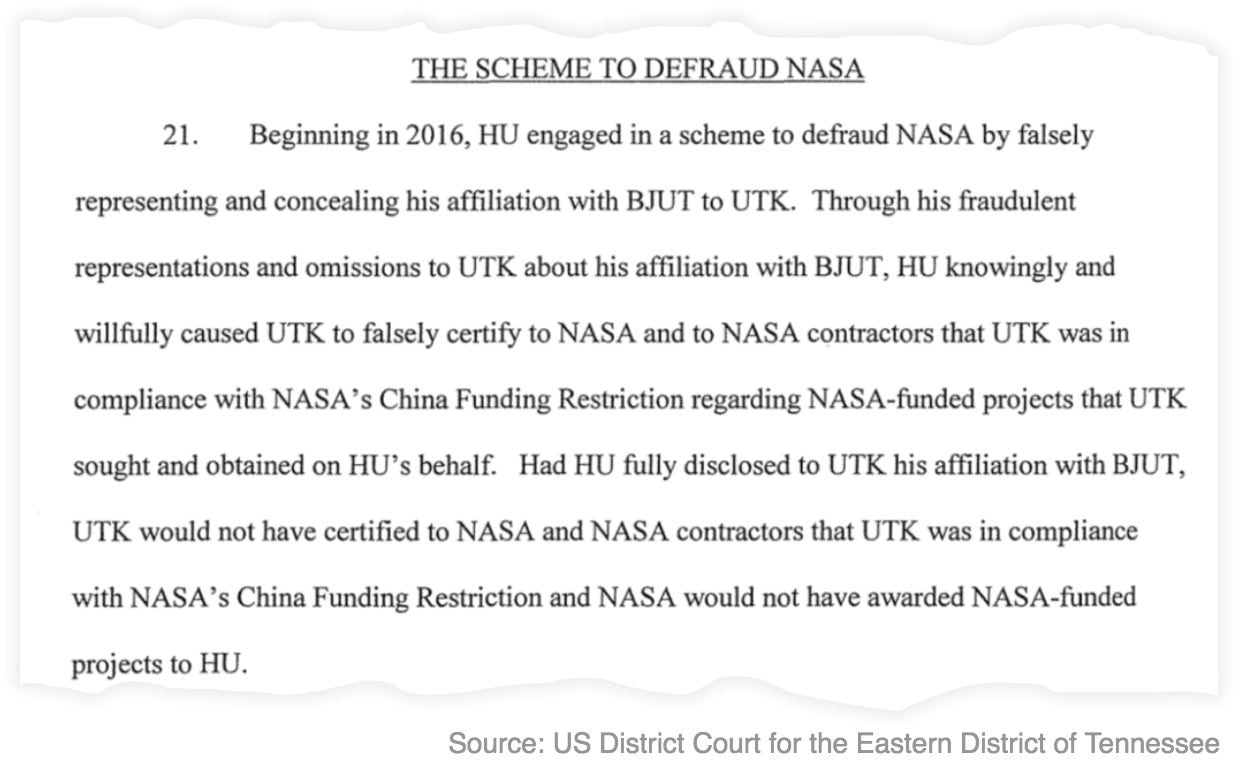Tennessee professor charged with hiding China ties from NASA
An engineering professor at the University of Tennessee was arrested today after allegedly concealing his relationship with a Chinese university while working on projects for US government agencies, including NASA.


An engineering professor at the University of Tennessee was arrested today after allegedly concealing his relationship with a Chinese university while working on projects for US government agencies, including NASA.
Anming Hu has been on the faculty of UT Knoxville’s Department of Mechanical, Aerospace and Biomedical Engineering since 2013. But, prosecutors said in an indictment unsealed today, he was also a faculty member at the Beijing University of Technology’s (BJUT) Institute of Laser Engineering, pursuing research sponsored by the Chinese government, and actively hid the affiliation from UT officials.
While NASA is often promoted as a diplomatic tool, capable of bridging geopolitical controversies with its focus on research and exploration, the US space agency is restricted from funding any activity that that cooperates or collaborates with the Chinese government or Chinese companies, including Chinese universities.
According to court documents, prosecutors say NASA would not have given any funding to UT Knoxville and Hu had the space agency been aware of Hu’s affiliations in China. Hu’s research was supported by $110,000 in federal contracts.

Prosecutors noted that BJUT’s public-facing website “identified Hu as a professor at BJUT and Hu’s biography portion of the website stated that Hu was hired by BJUT in September 2013 as a Distinguished Professor.” Other public evidence includes Hu’s BJUT e-mail address, and six published papers that identify him as an affiliate of the university. His name was also on 12 Chinese patent applications applied for by BJUT.
Hu is also accused of falsely telling UT Knoxville “that he was not an employee of any organization,” and failing to include his affiliation with BJUT on a CV he submitted as part of a tenure application. This, along with failing to mention BJUT on the conflict of interest forms he was regularly required to sign, constituted part of his “scheme to defraud.”
Even if UT Knoxville wasn’t in the habit of googling its potential professors, it seems unlikely that the school knew nothing about Hu’s work overseas: Its website once proudly advertised his Chinese collaborations. The school has since scrubbed Hu’s online profile and any mention of his research.
And while Hu is not accused of anything espionage-related, former US intelligence officer Nicholas Eftimiades, an expert on Chinese espionage operations, said Hu’s general field of study—nanomanufacturing and laser-based processing—would be of great interest to China.
“This technology has very specific applications in etching semiconductors that are critical to the Chinese government,” Eftimiades told Quartz. “It is an area in which they lag behind us and have been trying to become self-reliant. Well, self-reliant in production, not in developing the technology themselves. That, they steal.”
Hu is currently detained awaiting a court appearance next week. In a statement provided to Quartz, a UT Knoxville spokesperson said that he has been suspended.
“UT officials have cooperated with federal authorities during the investigation,” the statement said. “University leadership is fully committed to adherence to grant procedures and the protection of intellectual property.”
Ben Sharp, Hu’s public defender, as well as a spokesperson for the US Attorney’s Office for the Eastern District of Tennessee, which is prosecuting Hu, declined to comment. NASA and the Caltech’s Jet Propulsion Laboratory, which issued Hu a contract to develop technology for a Mars sample mission, did not respond to requests for comment at press time.
“The United States Attorney’s Office takes seriously fraudulent conduct that is devised to undermine federally-mandated funding restrictions related to China and Chinese universities,” US Attorney J. Douglas Overbey said in a statement.
The restriction on NASA’s funding of work related to China is the result of a law championed by retired Virginia Rep. Frank Wolf, who criticized China’s human rights record and compared the country to Stalin’s Russia. At the same time, the US has continued in-depth cooperation in space with Russia, another serial human rights violator, even after it invaded and annexed Crimea.
As far as Quartz can determine, no previous prosecution has been brought for violating the China funding restriction. In 2013, a Chinese national was arrested for violating data security policies, but ultimately pleaded guilty to downloading TV shows and other copyrighted material on a government computer and was deported; his supervisors at NASA received formal slaps on the wrist.
The restriction is controversial within the agency, where many employees are scientists and see their role as advancing human knowledge regardless of politics.
That mood was captured at the 2019 International Astronautical Congress, held in Washington, DC. Top Chinese space officials were expected to attend, but due to problems obtaining visas from the US government, they missed a major plenary that brought together the heads of the world’s most important space agencies. The top query on a list of crowdsourced questions was “Where is China?“
“It’s not nice for me, because I’m always looking forward to interactions with all states worldwide, so I’m sad that they are not here,” Jan Woerner, the head of the European Space Agency, said at the time. Lower-level Chinese officials eventually appeared at some events later in the week-long conference.
The Hu case appears to be part of a broader Department of Justice effort to stymie Chinese attempts to obtain US technology, a concern also driving trade tensions between the world’s two largest economies.
Federal prosecutors recently indicted a Harvard professor, Charles Lieber, who lied to investigators about his financial connections to Chinese universities. They have also stepped up prosecutions of individuals attempting to smuggle technology like data on US missile systems and radiation-hardened microchips into China.
In 2006, UT Knoxville professor J. Reece Roth was prosecuted for export violations related to a Chinese university while working on projects for the US Air Force.
This story has been updated with comment from Nicholas Eftimiades